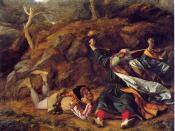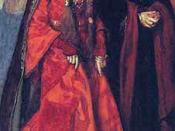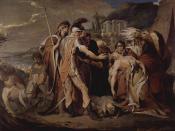Integrity, compassion, and justice are important facets of an effective king. The king is more than the physical evidence of a strong and united government. The king is God's representative on earth, and as such, serves as a model of behavior for all his subjects, who look to their king for guidance, strength, and hope. If a king lacks the essential components of kingly behavior, and the authority that these traits embody, his subjects will, as Goneril and Regan demonstrate, turn increasingly to deception, treachery, and violence as a method of government. Does Shakespeare's depiction of King Lear offer the audience a portrait of kingship, or in contrast, a portrait of kingly loss?
In his first scene, Lear initially comes across as a strong ruler, although his plan to divide his kingdom among his three daughters seems rather short-sighted and self-serving. This decision places his two strong sons-in-law, Albany and Cornwall, in charge of protecting the outlying areas of the kingdom.
But the single benefit derived from this division creates many problems. Lear is abdicating his purpose and his responsibilities, and he is also creating chaos. To achieve his goal, Goneril, Regan, and Cordelia are forced into a love test to determine their inheritance. The division of any kingdom is not without risk, but even before his action has the opportunity to create adversity, Lear establishes a competition, which complicates an already dangerous decision.
Competitions, by their very nature, result in winners and losers. Cordelia loses when she refuses to play the game, but Lear also loses when he "retires" and abdicates his kingly role. He cannot be king without a kingdom, and the country, which is to be divided into smaller principalities, will not have the unity and strength to long survive as separate units. Civil war and...


